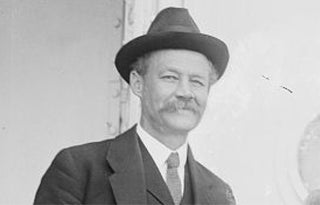Wilfred Grenfell was born in 1865 to a Cheshire clergyman and school owner. In his youth he acquired a lifelong love of sailing and a passion for sports. He studied to be a doctor and under the wise and patient guidance of the distinguished Christian surgeon Frederick Treves, began working amongst the deprived communities of London.
Encountering one of D.L. Moody’s evangelistic meetings, Grenfell made a commitment to Christ, and with the outstanding energy and enthusiasm that was to be the hallmark of his life, threw himself into every kind of evangelistic witness. Qualifying as a doctor, Grenfell joined the National Mission for Deep Sea Fishermen. Fishing at this time was extraordinarily hazardous: deaths and accidents were common at sea and the fishermen and their families lived in dreadful conditions. Grenfell worked at sea as a doctor and evangelist, and on land started numerous initiatives to improve the lives of fishermen.
In 1892 a fishing disaster off the British colony of Newfoundland pricked the national conscience and Grenfell was sent to see what could be done. He fell in love with the wild seas and rocky coast of Newfoundland and Labrador but was shocked by the suffering he encountered. There, tens of thousands of people made a precarious living from catching cod, but were cruelly trapped financially by the traders from whom they had to hire their equipment. Little more than slaves, they lived in squalor, wore rags and, having an inadequate diet, suffered chronic ill-health. Grenfell set to work treating hundreds, giving out blankets and preaching the gospel. He realised his calling was to the suffering Inuit and First Nations peoples of the Labrador coast. Grenfell returned the following summer with more doctors and nurses.
In a pattern that was to be repeated over the next four decades, Grenfell travelled with adventurous vigour – healing, preaching and setting up social relief projects. He was the classic pioneer: starting social and medical initiatives and then leaving them for others to develop as he moved on to something new.
For all his constant action, Grenfell was a shrewd analyst. He realised that to achieve any progress, the corrupt and oppressive trading system had to be broken. He set up cooperatives where profits were shared, raised the price paid for fish, found alternative employment for the winters and bullied the government into funding schools and clinics. Inevitably, he faced bitter opposition but, utterly unstoppable, he simply pressed on.
Grenfell started fundraising tours in Canada and in the USA; as a gifted speaker he inspired volunteers and donors. He began writing and his many books spread his influence further. As the twentieth century dawned it became clear that many of Grenfell’s projects were a success. The cooperatives were easing poverty; the economy was more diverse; and hospitals and schools were improving life. Grenfell, however, continued his relentless activity, his love of action giving rise to many accidents and nearly fatal incidents. These simply added to his growing status as ‘Mister Labrador’.
In 1909 Grenfell met Anne McClanahan on a voyage to the USA and proposed to her within three days. It proved to be a successful marriage with Anne not only bringing stability to his life but becoming his secretary, editor and adviser. By the 1920s, with many of his ventures now well established and run by committees, Grenfell – aided by a knighthood – slipped into the role of an influencer, generating publicity, funding and investment. Finally, in 1933 Grenfell left north-east Canada and, with Anne, moved to the USA. She died there in 1938 and Grenfell followed her in 1940, dying at the age of seventy-five.
Grenfell’s achievements are astonishing. One account claims he was directly or indirectly responsible for the existence of six hospitals, four hospital ships, seven nursing stations, two orphanages, two schools, fourteen industrial centres and various cooperatives.
Let me highlight four challenging aspects of his extraordinary life.
First, Grenfell served. At the centre of his Christian faith was the idea that a life should be lived for the good of others. For four decades, often putting in eighteen-hour days, that’s exactly what he did. And Grenfell served wisely too: persuading, demanding and even shaming authorities and individuals into action.
Second, Grenfell innovated. He was one of the pioneers of holistic mission: of preaching the gospel and tackling social issues. His initiatives to improve life on the coast were remarkable with new employment strategies, new sources of income and new ways of improving society.
Third, Grenfell’s work was multiplied. What Grenfell did – and with utter brilliance – was inspire others to work alongside him.
Ultimately, Grenfell acted. Doctor, surgeon, missionary, speaker and social reformer, Grenfell was a man of action, improving tens of thousands of lives.
In our day, where injustice and suffering continue, I think the world could use a few more people like Wilfred Grenfell.
J.John
Reverend Canon




